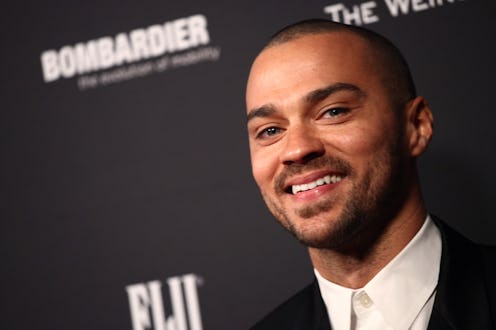Entertainment
You Have to Hear Jesse's Thoughts About Ferguson
At a certain level, celebrities talking about big political issues is a minefield for ignorance and gross levels of insensitivity. Joan Rivers on the Isreal-Palestine conflict? Not an opinion I ever needed to hear. But I do think that people should hear what Grey's Anatomy 's Jesse Williams is saying about Ferguson. Not because he's on Grey's Anatomy — that qualifies him for little more than playing more imaginary people and pronouncing complicated medical words — but because what he's saying is really smart, really important, and something that needs to extend past the CNN broadcast on which it took place and into our daily conversation.
This issue, it should be noted, is also one that affects Williams pretty directly: He's a mixed-race, visually black man, and black men are the oppressed party these demonstrations are speaking up for. They're the ones we should be listening to when they speak up about the pain of the repeated killings of black men in this country, from Trayvon Martin, to Mike Brown, to Ezell Ford, a young man killed by LAPD the same week as Brown. They are, after all, the ones who have to carry that with them every time a police officer looks their way. Here's a bit of what Williams said in his appearance on CNN:
There's a complete double standard and a complete different experience that a certain element of this country has the privilege of being treated like human beings, and the rest of us are not treated like human beings, period. That needs to be discussed, that's the story. That's what gets frustrating for people — because you don't know five black folks, five black men in particular, that have not been harassed and felt threatened by police officers. You can't throw a rock and find five of them. We're not making this up.
As someone with a very similar racial mixture to Williams (and Barack Obama), it's strikes me every time something like the killings of Martin or Brown make the news how undeniably different my life would be if I had been born a shade or two darker. My race is visible, but it's not visible in the same way that it was for Mike Brown, or Renisha McBride, or the millions of black people in America who can relate so thoroughly to the harassment on the hands of authority figures. Williams, as he states above, has certainly experienced it — likely because of this country's long, violent history of categorizing visibly black men as dangerous thugs.
That I have likely been treated with more humanity and compassion by authority figures because I happen to have been born on the lightest side of the scale? My skin tone and my gender should not be a stroke of luck. My skin tone and my gender should not be the thing standing between me and a bullet to the head.
We have to listen when people like Jesse Williams speak up about their experiences and how it relates to the continued murder and unrest we see in our newsfeeds — the same goes for people like Antonio French, and Buzzfeed's Joel Anderson, and Questlove, and the myriad of other black people in this country without the benefit of a famous name or a social media following. They — like one of my brothers, like my father, like half my cousins — will carry this all with them their entire lives. The absolute least we can do is listen.
